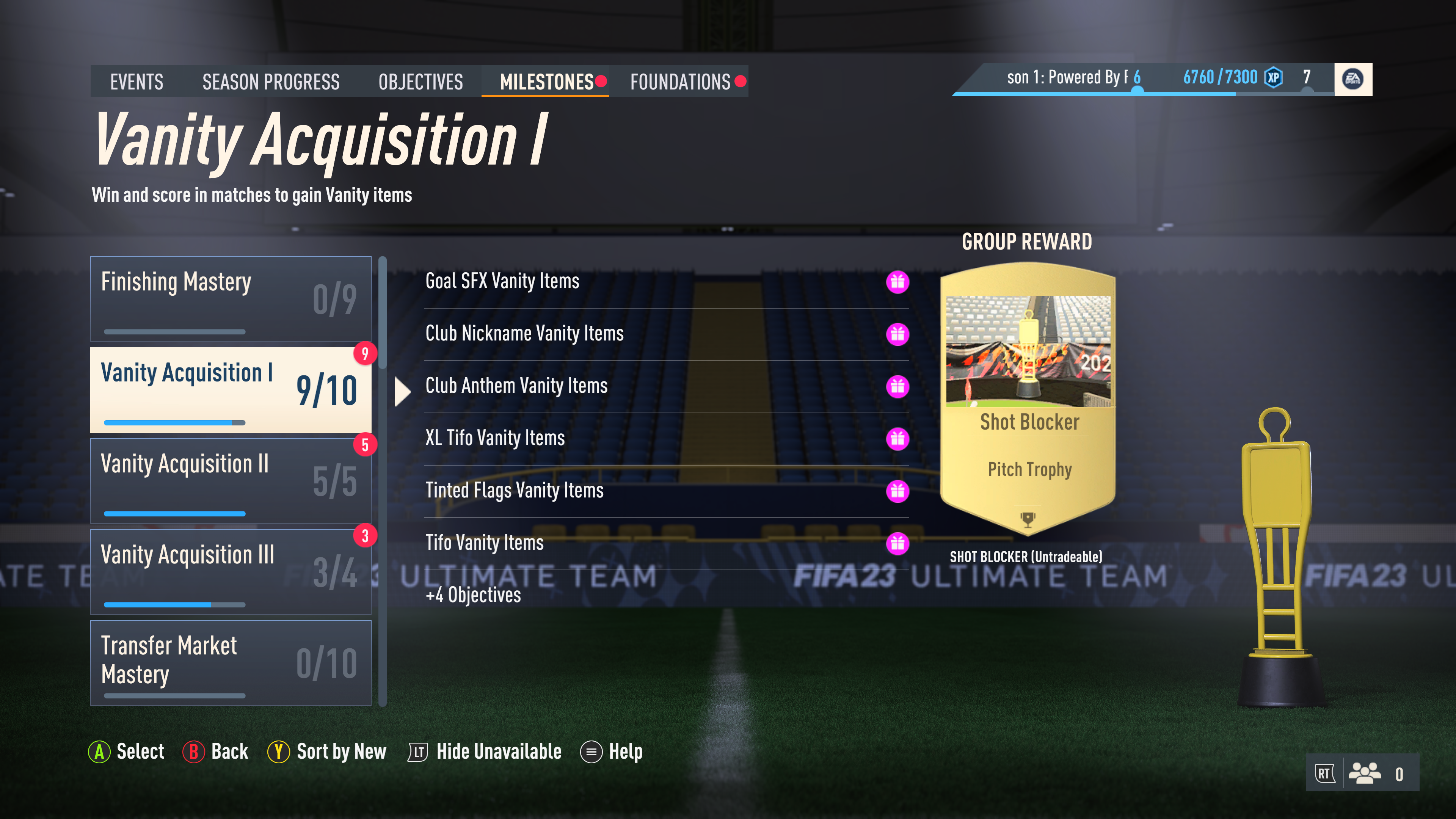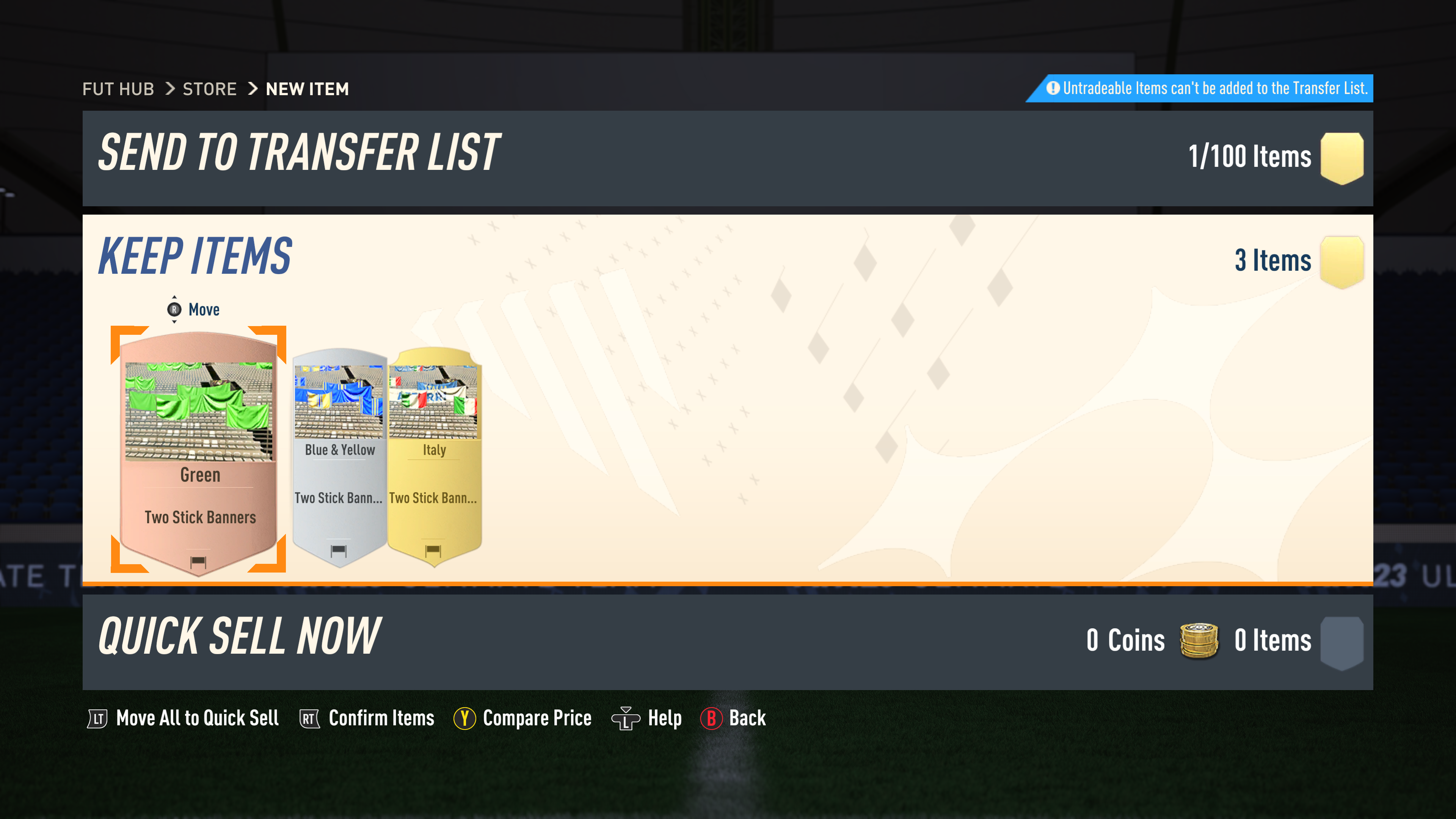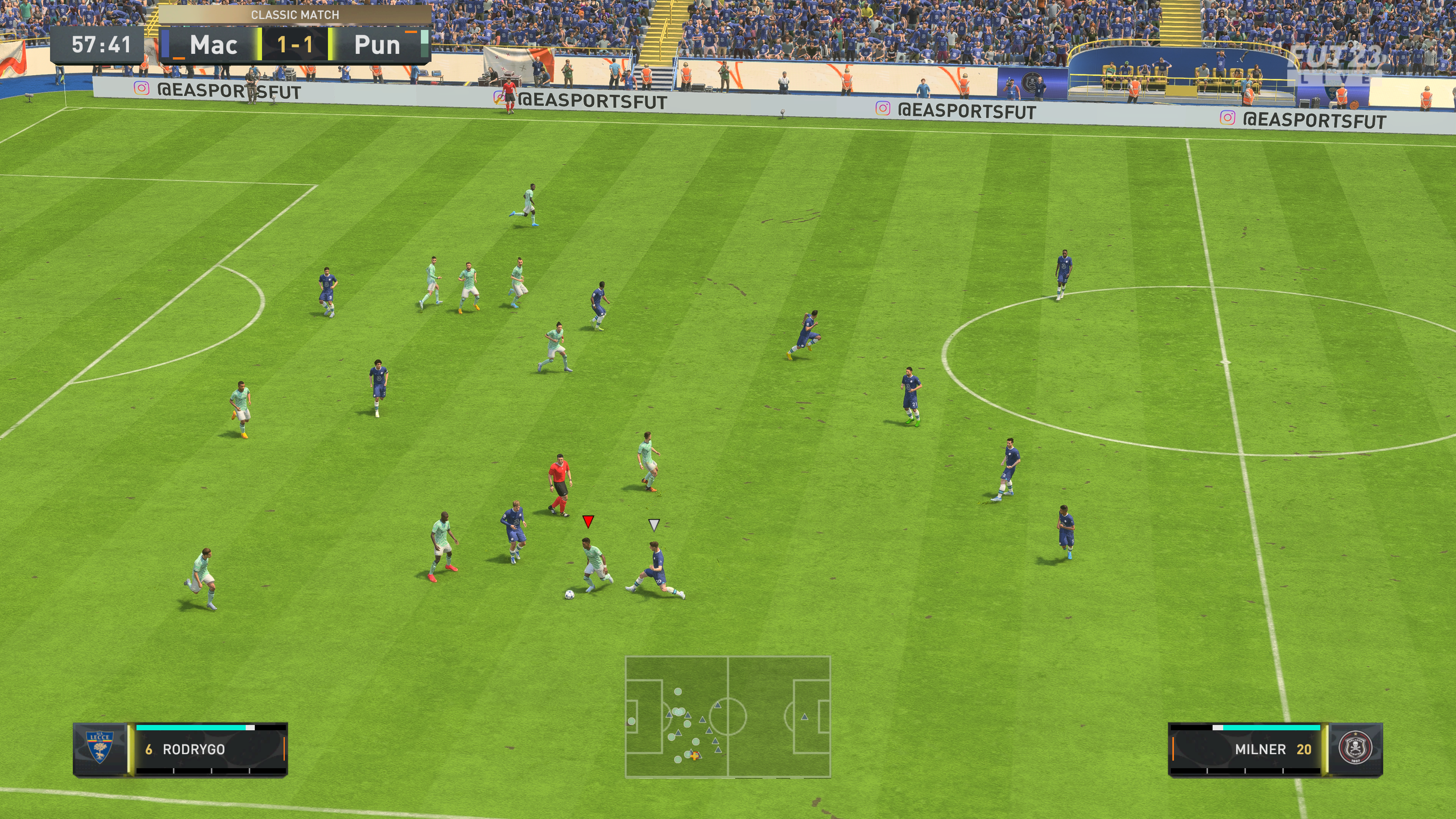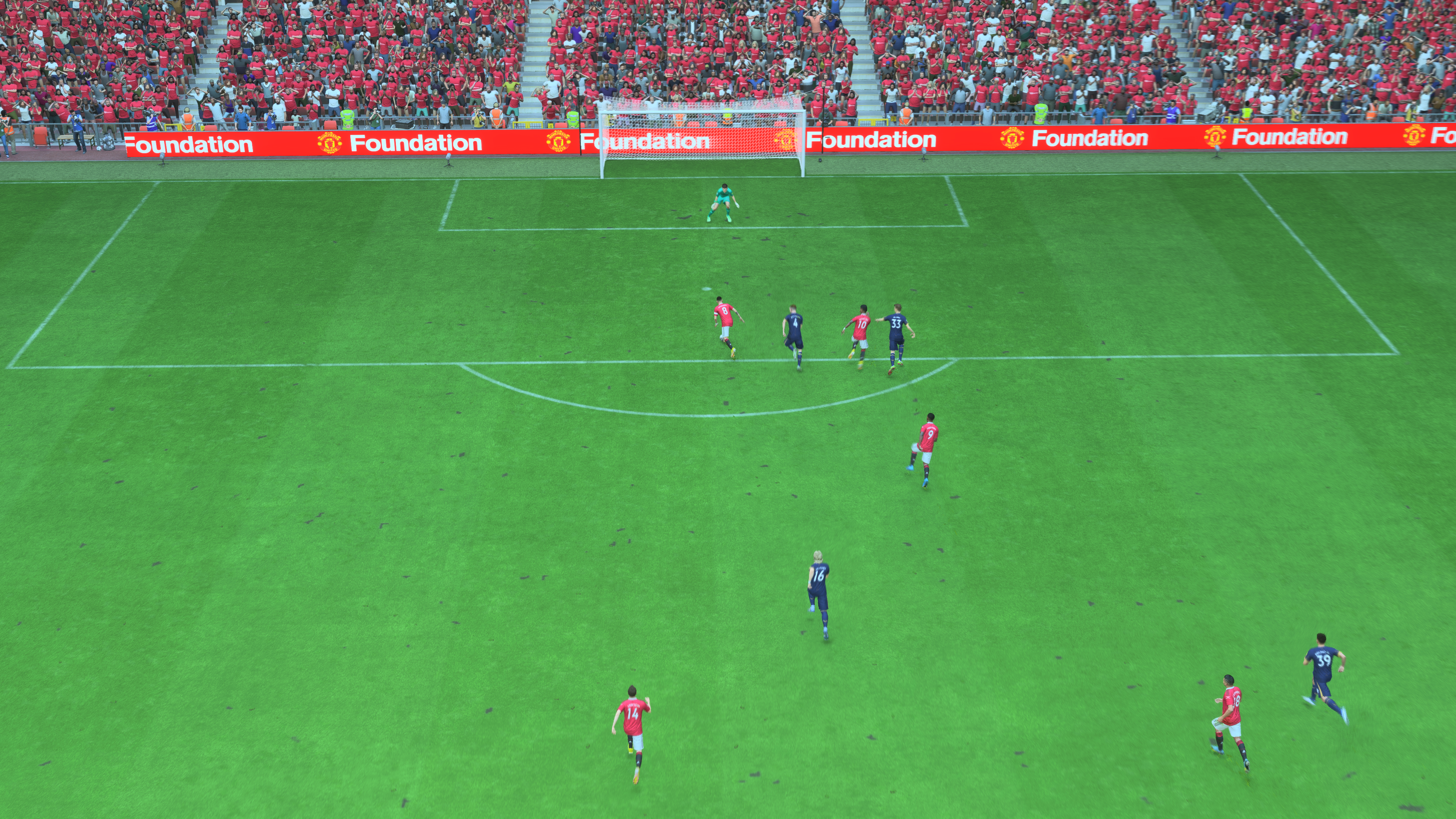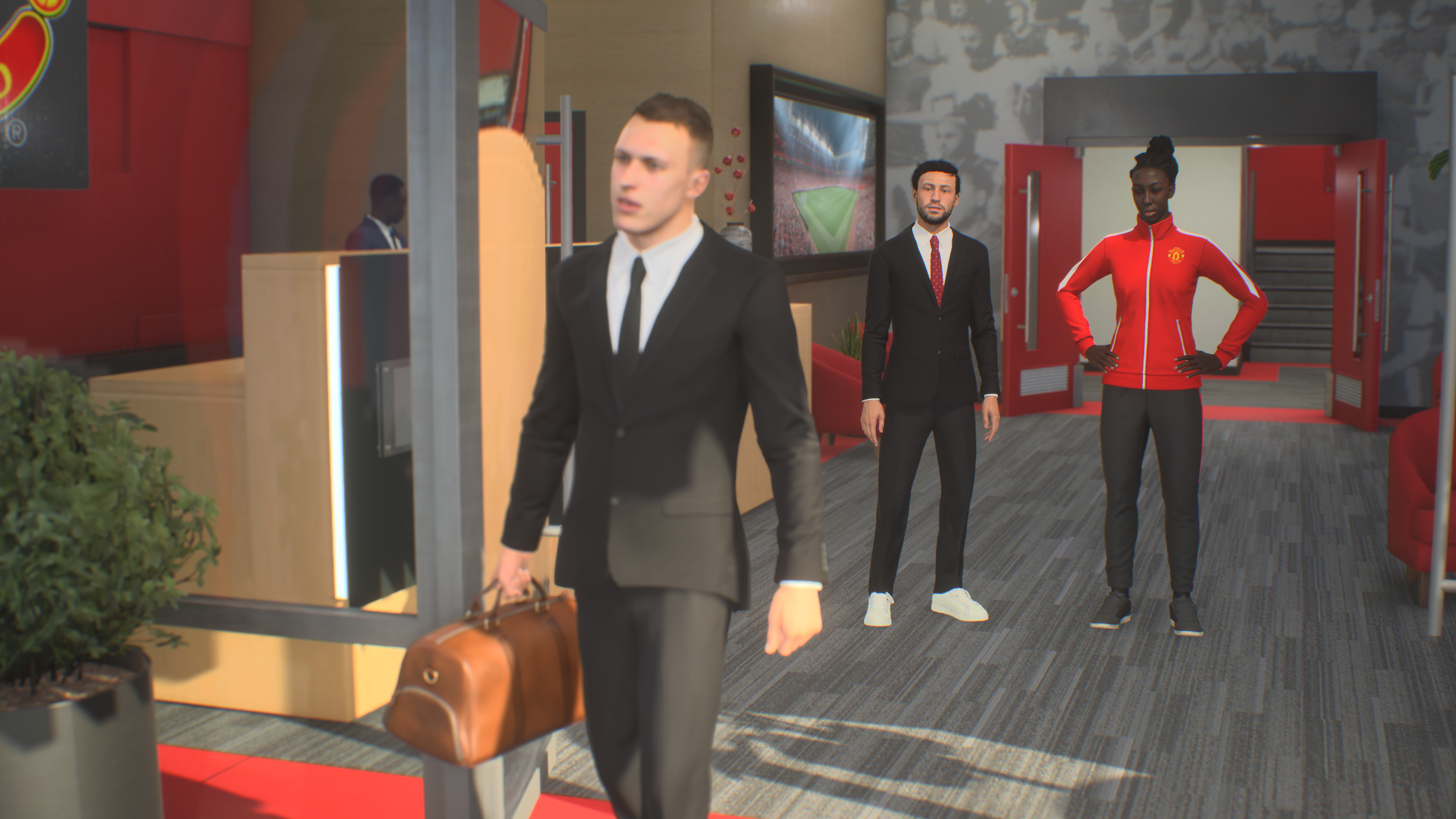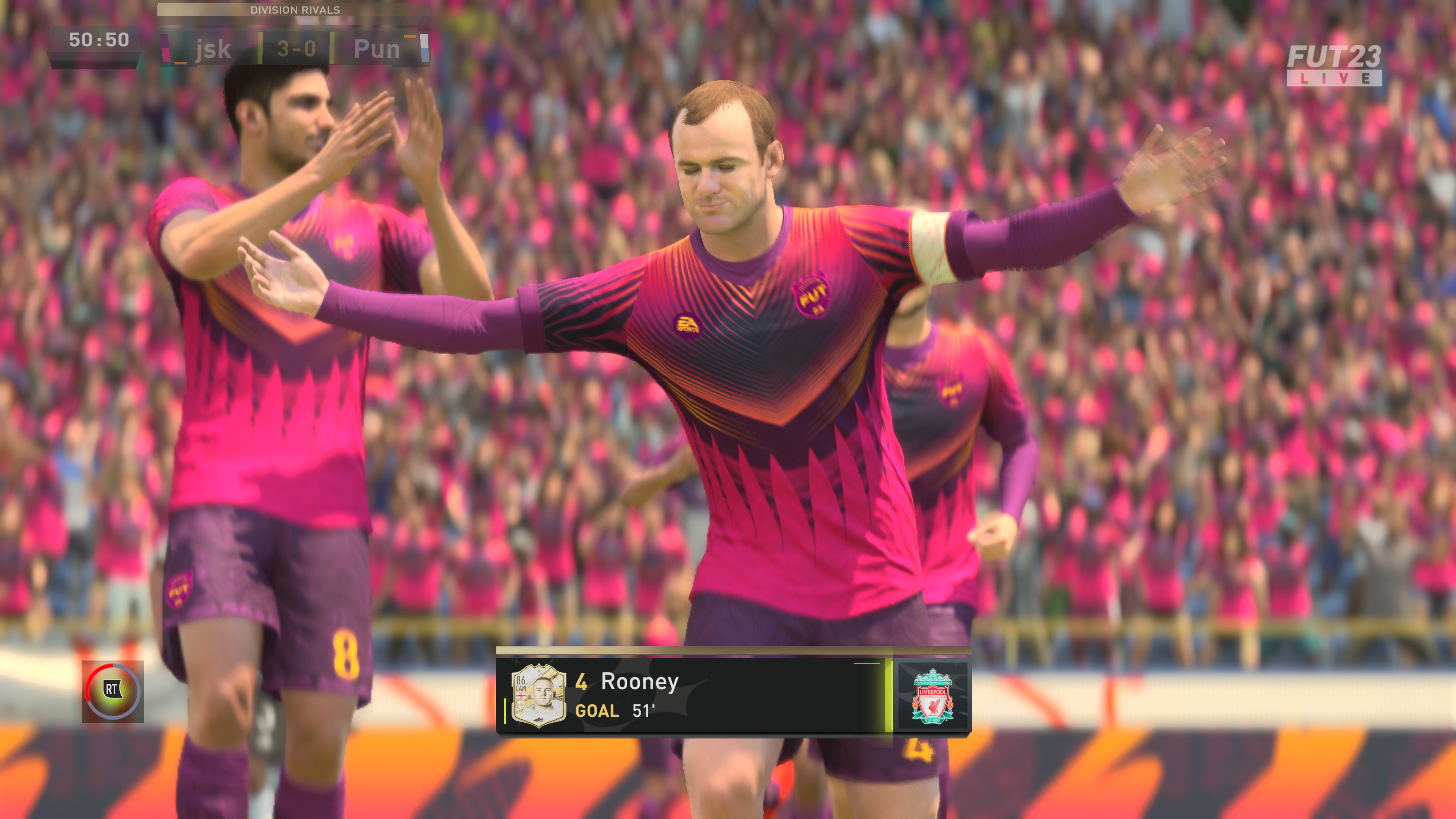Only, I haven’t completed an objective. I have, after two games and nothing else, completed 26 objectives. And these objectives are scattered across five sub-menus, each of which contains maybe a dozen or so groups of objectives, of which there are again up to a dozen or so objectives therein. Clearing these notifications means navigating through this Russian Doll of to-do lists and individually selecting each one, selecting it again to see the reward, and again to claim the reward. That’s not all! The reward, if it’s an item or, better yet, a pack, then goes to the Store page, which is an entirely different menu. I have 19 items in the store after clearing and claiming rewards for my 26 objectives, and so, off I go to open them. What followed for me, as it will for you, is an interminable parade of tat. As reward for my literally average performance across my first two games I have been granted the honour of packing all kinds of stadium cosmetics, such as Two Stick Banners - Green, a card which puts some impressively garish, bright green flags in the crowd; a Grape coloured goal net; the club badges for Swindon Town and Chengdu Rongcheng FC (Bronze rare!); red pitch lines; a True Blue coloured goal net; orange pitch lines; and, my personal favourite, a new club nickname: “(The) Crabs.” The process of clearing, receiving, and opening all these objectives and rewards, across the depths of what must still be the laggiest UI in video games, thanks to it all being handled on a server somewhere, took just over 20 minutes. Longer than those first two matches combined. The resulting sense, at least for me, is a kind of all-conquering ennui. The kind where, in a brief flash of blackness between the gold-plated stages and pumping dance music and strobe lights and confetti cannons, you catch the reflection of your own face staring back at you. What the fuck am I doing with my life? But hold on - it’s a Tifo, it’s Gold, it’s the Republic of Ireland flag! Each of these relentless pack openings is fêted with such ludicrous, overblown fanfare that I feel like I’ve won the Ballon D’Or itself, 19 times over. Ennui, pushed to these kinds of limits, these dancing, crowd-cheering, tinsel-drenched extremes, quickly turns to disgust. We know this by now about Ultimate Team. It’s been here for years and it hasn’t changed all that much. I’m obliged to mention this year’s main addition is Moments, which are like playable, minutes-long highlights; the headline series is one that “tells the story of Kylian Mbappé’s illustrious career” - Mbappé is 23, has yet to win a Ballon D’Or, and just signed a contract with Qatar-owned PSG that paid him a reported €100m signing bonus and a €50m-per-year salary, as well as giving him an unprecedented influence over the club’s transfers, too. A playable hagiography for the sport’s most indulged player feels a touch premature. But the wider issues with FUT bear repeating because it’s only more popular and more embedded in the culture of football itself with each new entry. So onwards. All the worst parts of modern engagement-farming design are here. The red notification dots that keep you looking at your phone, the level-ups, the league-climbing system, the second- and third-screen web apps, the loot boxes, of course (the preview system is a nice try but does nothing, effectively giving you one free look a day, but positioning that right next to the blind pack you can infinitely buy - it’s nothing more than a free taste, first roll on the house, masked as some kind of concession), and don’t forget the actual games themselves, the kind of recurring head-to-head, just one more game multiplayer that would be almost toxically moreish as it is, goading you into another match with rage as much as enjoyment, without all the rest. It goes on. Consider how FIFA and Ultimate Team is one of the most expensive service games out there, thanks to its annualisation - but also one of the most infrequently and unsophisticatedly updated. Consider the way the moment-to-moment of a FIFA game actually feels, oddly, like marketing for a FIFA game - the relentless pop-ups, promotional events, player cameos, and general razzle dazzle all seem aimed at selling you on a game you’ve already bought, on the prestige of the brand. Worst of all, consider the transfer market in FIFA Ultimate Team. A market modelled on actual financial markets, which inspires private Discords and subreddits and Facebook groups and YouTube videos and ads for third-party websites or apps, all aimed at those who want to make pseudo-money, to learn to beat the house. Notice how these spinoff communities - cottage industries - all take on the exact form of those that would sell you on the art of actual day trading: buy my book, take my course, join my Patreon and I’ll teach you how, with just one hour a day, my trading technique bought me this house, this watch, this Ultimate Beast Mbappé with 99 Pace. Now notice the link between football fandom - talking real football for a second - and betting; how many betting sponsors there are on professional teams’ shirts, on stadium ad boards, in half-time breaks or owned by the broadcasters themselves. And also the link between football fandom and asset trading: cryptocurrency, Socios tokens, a pseudo stock market called the Football Index, all the star players suckered into selling their own NFTs, how many fans bought them, and how all of them, without exception, have since sunk to a value close to zero. All of this, fundamentally, is gambling. Ultimate Team is gambling. The only thing that makes it not gambling in the eyes of regulators is that you can’t “cash out” - sell the things you’ve won in-game for real money. I’d argue that makes it worse. Ultimate Team is like a casino where you have a chance to win chips that can only be spent on in-casino prizes, that you can only use to earn more chips, and that you cannot take outside of the casino. Then, next year, all the prizes you won so far get taken away, and you have to pay another entry fee to start from scratch. This is a casino where you can only lose. Where the argument in defence is that the act of gambling itself, detached from monetary gain, is fun. That would be fair, it’s just like playing a game of cards - but not when you can pay for a chance to pull an ace. It’s not better than cashing out. The sum of all this is a game mode explicitly designed to trigger, if not addiction, something very close to it. A pseudo-addiction. A life-consuming, obsessive compulsion. FIFA Ultimate Team is in its purest essence an Operant Conditioning Chamber, only designed for football fans, instead of rats. And breathe. Last night I played a handful of casual, online games against our other resident addict Wes Yin-Poole, and it was some of the most fun I’ve had gaming in weeks (unrelated to the fact I won). This is the endless dilemma with FIFA in its modern form. Half of this game - possibly a lot more than half, depending whether you’re weighing things by playtime and influence or just the literal number of modes - is openly vile. The other half is effectively just a variety of ways to have a kickabout. The purest fun. Thinking about it all at once feels like reviewing a children’s playground built inside the Bellagio. Still, both parts are as real as each other. Gameplay this year feels, in a word, good. EA Sports’ latest non-trademark is HyperMotion2 Technology, a more advanced form of animation that involves machine learning and fancy motion-capture suits for players. In theory it means things look a little more realistic, which is welcome. In practice it makes a bit of difference, but also last year’s big thing was HyperMotion Technology and that also used machine learning and fancy suits. And really, FIFA has always been at its best when it played a little more arcadey and a little less simmy. The best addition this year, by some way, is also the most ridiculous. That is: power shots. A new move, holding down the two shoulder buttons and pressing shoot will see your player wind up exaggeratedly before launching an absolute rocket towards the goal. The results are wonderfully funny: most of the time, it takes so long to prepare a shot that you’ll get absolutely clattered. When you don’t, accuracy can vary wildly, from thunderbolts into the top corner to blocks that look like they should take a defender’s head off and wild lashes that almost hit the corner flag. Best of all, this dovetails with a legacy feature called timed shots, where you can press shoot a second time to generally make the shot a bit better (or mis-time it to make it much worse). Mixing the two together, however, I found you can still score a power shot when mis-timing the second button-press. The first time I did this it resulted in something I can only describe as a Power Chip, scored against a friend, where the ball wafted impossibly through the air like it was travelling underwater and miraculously lobbed the opposing goalkeeper, despite him being stood barely a foot from the goal line. This is a bit of a bug: the replay clocked the speed of the shot at about 120mph, slightly faster than two thirty-yard firecrackers I scored later on. It’s also the hardest I’ve laughed in a little while. There are other additions, and they’re positive. You can now turn off negative commentary, which I truly love. The womens’ game features more prominently than ever, with the addition of club football in the Women’s Super League and Division 1 Arkema capturing what feels like a genuine sea change in the wake of Euro 2022. It’s also properly motion-captured, as you’d hope. Visibility, fairness, and proactive action is what that rapidly growing side of the sport needs, and there’s no downside to the inclusion of Sam Kerr and co here. There’s also crossplay between equivalent platforms - PS5 with Series X/S, PS4 with Xbox One - for the first time, which is hugely welcome, when it works. (At the moment it does take one of us closing the game entirely and then restarting it for a cross-platform invite to show up - hopefully that improves.) And, be it the HyperMotion (I doubt it) or some other work behind the scenes, some long-standing frustrations of mine have been seen-to here. Slide tackling, at last, feels viable again, with huge, at times laughably over the top tackles resurfacing for the first time in almost a decade but also actually winning the ball sometimes, too. Goalkeepers have had a rework, and do feel a little stronger as a result, but the conversation here should avoid the question of whether or not they’re “overpowered” to whether they just feel fun and the situations they create varied. They do, and it’s a welcome change. I’ve scored a variety of goals, the ball moves in a variety of ways, it feels like a few playstyles are viable, although I’m sure the community hivemind will see to that in more competitive play online, as it always does. On the flipside there are problems here with gameplay, too. For one, FIFA’s gameplay is actually somewhat buried, as the game as a whole is made up of menus as much as matches - certainly in Ultimate Team but also in Career Mode and beyond. Where, in games like Football Manager, menus are actually gameplay, tasking you with thinking strategically and responding to interesting, emergent dilemmas in a living world, things like Career Mode have been largely static for a decade, while I’ve already spent too long on the murky, laggy menus of Ultimate Team. Beyond that, some older frustrations remain. Tactics don’t really get close to reality - it’s not often you’ll see anyone, even the AI, trying to keep you out with a spot of Catenaccio, say. And the AI, while always improved on the previous year, can still get into an almighty muddle. Too often I hear myself muttering “where’s he going?!” about a central defender running up the pitch while an attacker darts through on goal, and entire back fours can often be dragged ludicrously deep - into their own box - while the ball’s barely their side of the halfway line, due to a single opposing forward making a run. It’s frustrating. More importantly, these little issues can force you to play something completely unlike football in your head, where your focus lands on how to exploit the way FIFA plays, rather than how the real sport works. Referees can also still seem like they’re watching another sport entirely. Fixing those things may take years, though, or may just be endemic to the nature of making a sports game when the real thing is arguably the most complex in the world. And more importantly, what my mind still comes back to is that ridiculous power shot - or rather, my masterly Power Chip - that is really the essence of Good FIFA. It’s a bizarre fluke of circumstance, almost feeling like a bug - but in the same way shanking a ball into a lamppost and seeing it ping into the top corner is a bug, when you’re knocking it about on the local 4G. The way a mate might slide tackle it straight into his own net, or you trip over your feet trying a rabona. Football, as FIFA the game and FIFA the organisation both like to proclaim, is for everyone, and by dint of that it is fundamentally silly, and fundamentally flawed. It’s an infinite anecdote generator - football anecdotes in my own family go back generations, and in some sense I can see the same being said one day about our most ludicrous memories of FIFA. More seriously, this sport at its best, and FIFA too, is group therapy. A kind of communal, primal decompression after staying late at work, a Tuesday afternoon with English followed by double Maths. FIFA 23, like all FIFAs, still captures this and still plays enabler to it, and I believe EA Sports’ desire to do so is sincere. That’s an admirable goal. It’s just that with Ultimate Team, and the cost of it, the pompous marketing, the whiff of gouging exploitation and the vast, horrific spectre of gambling that looms over it all, it’s a goal ruled out by the most egregious VAR. With the age of FIFA coming to an end - next year, EA Sports is going its own way, renaming the series EA Sports FC, while FIFA the organisation scrambles to do its own thing - FIFA 23’s messy, conflicted, simultaneously brilliant and grotesque reflection of a brilliant, grotesque sport feels like a fitting end to the era.
